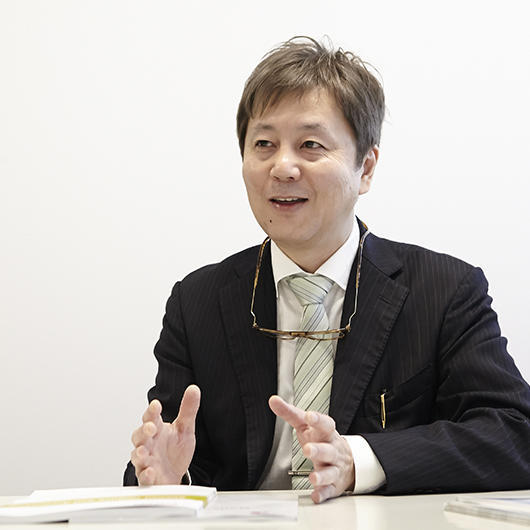- TOP
- Cutting-edge Research and Social Contribution
- Cutting-edge Research
- Promoting the global value of Japan's unique accounting audit system

Promoting the global value of Japan's unique accounting audit system

UEMURA Hiroshi
- Specialized field
Certified Public Accountant Audit, Financial Accounting
Questioning the relevance of independent monitoring systems
The certified public accountant audit process is widely thought to be essential to ensuring the reliability of corporate financial information. However, looking at cases of accounting dishonesty that have disturbed Japanese society recently, it can be said that the audit system is not functioning perfectly. Associate Professor Uemura has been conducting research on the roles of managers, accountants and corporate governance in the auditing system and the impact of that system on the financial reporting process.
Dr. Uemura gives an example of the need for improvement, "For example, if the sales in a given fiscal year are reported as 10 billion yen in the financial statements, that is only a claim made by the management. It is necessary that a certified public accountant, acting as a third party auditor, inspect the evidence for the numbers and judge that the accounting is error-free. Two years ago, there was a news report that over the previous few years there had been huge errors in Toshiba Corp's financial statements, possibly intentional, with some indication that the auditors might have been aware of those mistakes. How could such a thing happen? The answer lies in the fact that accounting is negotiated among people. Auditing is not just an investigation or report: it's also a place where management and auditors make decisions, and various factors can interfere with the process of establishing the validity of the numbers. I began my research because I was interested in that phenomenon."
The reliability of financial information is not only influenced by third party auditors, but is also greatly influenced by monitoring by internal organizations within the company. In the United States, each company has an internal audit committee including independent directors; that monitoring system has been established to ensure that the company is operating without fraud. In Japan, on the other hand, each company has an organization called the board of auditors. In many cases half of the board members are external auditors and the other half are people somehow related to the company, for example people in honorary positions. Lately there has been a tendency for Japanese companies to follow the example of Europe and the United States, so the internal audit system is becoming mainstream in Japan, but Dr. Uemura has raised some important questions about that trend; he is now attempting to assess the validity of the corporate auditor system in Japan.
Dr. Uemura points out, "There are frequent criticisms that the corporate auditor system in Japan is subject to ambiguity, and we are seeing the emergence of a new concept, the notion that corporate independence should be fortified so that the manager can be monitored from within the company, as is done in the United States, but I see problems with that. Japan has its own culture and its own approach to organizations. I think the idea that it is a matter of course that Japanese companies should establish audit committees is rather simplistic."
Currently the main thrust of research in this area in Japan is to examine the effectiveness of the system for enhancing corporate independence. However, Dr. Uemura has developed a new perspective, which could be summarized as, "Since the internal audit system does not harmonize with Japanese organizations, there is the distinct possibility of accounting fraud and scandals in large companies."
Creating an original audit system rooted in Japanese culture
Dr. Uemura pursued the question as to whether internal monitoring in Japanese companies is sufficient to ensure the reliability of financial information. Over the past five years he has collected numerical data from financial statements of more than 4,000 Japanese listed companies and compared that data with the content of audits created by certified public accountants. In addition, to determine whether enhancing the external aspect of governance is effective for Japanese companies or not, he statistically analyzed the quality of the accounting data of companies that already have external directors. He found that the the effectiveness of external directors in Japanese companies is doubtful. Dr. Uemura concludes, "I have to say that it is difficult for third parties to work inside a company and collect all the necessary internal information."
"While auditors in western countries mainly focus on discovering and disclosing inadequacies in corporate internal controls, Japanese auditors primarily give guidance and advice. Given Japan's cultural makeup, I think that it would better if those who are familiar with the company serve as corporate auditors. They would be able to collect information efficiently."
Then, specifically what kind of system is required? In order to search for monitoring systems suitable for Japanese companies, Dr. Uemura is conducting research in the form of interviews in large companies such as Panasonic, inquiring about current audit practices.
"There is a general acceptance in the world today of the view that humans are inherently evil, and take the position that management must be supervised by independent people. However, in contrast, in Japanese companies, the management trusts its employees, and there is a mechanism that encourages a flow of information from the employees. In other words, it seems that Japanese companies build systems for gathering internal information for higher-ups, rather than having third party auditors collect evidence. If I can convincingly present this as a system unique to Japan, it could make some impact."
In Japanese companies, introducing a self-assessment system could enhance employee motivation and provide a positive atmosphere in the workplace, creating a better situation than that resulting from using third party personnel to monitor internal affairs. Research efforts to date suggest the gradual emergence of a unique Japanese system.
It is essential for sound management to have a financial data mechanism based on both practical knowledge and theory.
At the age of 27, Dr. Uemura started a business with a friend. While promoting this franchise business and expanding it, he realized the importance of financial management. He says, "I focused on increasing profits at that time, but the business could run of control if I did not introduce a system of checks and balances. That made a strong impression on me."
While managing his company Dr. Uemura took a university course to study business administration anew. He was interested in how companies around the world construct systems to control and monitor accounting. That interest led him to his current research.
"My way of thinking has changed significantly since I started this research. I used to think that experience and intuition were the most important factors for business, but now I realize that it is essential to create a system based on practical and theoretical knowledge and to constantly make innovative revisions."
Recently Dr. Uemura started a consultancy for small and medium enterprises, in addition to his franchise business. By collaborating with regional financial institutions, he is helping to create businesses and supporting business revitalization.
In the latter half of the 1980s, the management structure of successful Japanese companies was a topic of research worldwide. However, after the collapse of Japan's bubble economy, Japanese companies attracted much less attention. Nevertheless, Dr. Uemura is enthusiastic about the future. He says, "It is essential for Japanese companies to focus on internal monitoring as a starting point and convince the world that the Japanese way of organizing is the equal of other approaches."
"Once Toyota's system of accounting management was greatly respected worldwide, and Japan drew great attention in that field. Through my research, I have determined that the internal monitoring system of Japanese companies is based on thorough calculations. If that the concept were disseminated to the world, Japanese companies would be in the spotlight again. In fact I believe that companies in Japan have a number of exemplary systems. I will work to identify them and promote their value.
